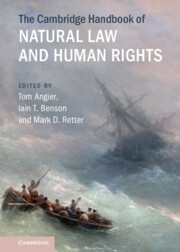Book contents
- The Cambridge Handbook of Natural Law and Human Rights
- The Cambridge Handbook of Natural Law and Human Rights
- Copyright page
- Contents
- Contributors
- Acknowledgements
- Introduction
- Part I Natural Law and the Origins of Human Rights
- 2 Natural Law and Human Rights
- 3 The Paradox of Shrinking Individuality
- 4 Synderesis, Conscientia, and Human Rights
- 5 The Case against the Marriage of Natural Law and Natural Rights
- 6 The Mythical Connection between Natural Law and the Universal Declaration of Human Rights
- 7 Natural Law and the Universal Declaration of Human Rights
- Part II Natural Law Foundations of Human Rights Obligations
- Part III Natural Law and Human Rights within Religious Traditions
- Part IV The Human Person, Political Community, and Rule of Law
- Part V Rival Interpretations and Interpretive Principles
- Part VI Challenges and Future Prospects
- Index
6 - The Mythical Connection between Natural Law and the Universal Declaration of Human Rights
from Part I - Natural Law and the Origins of Human Rights
Published online by Cambridge University Press: 03 November 2022
- The Cambridge Handbook of Natural Law and Human Rights
- The Cambridge Handbook of Natural Law and Human Rights
- Copyright page
- Contents
- Contributors
- Acknowledgements
- Introduction
- Part I Natural Law and the Origins of Human Rights
- 2 Natural Law and Human Rights
- 3 The Paradox of Shrinking Individuality
- 4 Synderesis, Conscientia, and Human Rights
- 5 The Case against the Marriage of Natural Law and Natural Rights
- 6 The Mythical Connection between Natural Law and the Universal Declaration of Human Rights
- 7 Natural Law and the Universal Declaration of Human Rights
- Part II Natural Law Foundations of Human Rights Obligations
- Part III Natural Law and Human Rights within Religious Traditions
- Part IV The Human Person, Political Community, and Rule of Law
- Part V Rival Interpretations and Interpretive Principles
- Part VI Challenges and Future Prospects
- Index
Summary
The Universal Declaration of Human Rights is often considered to be a part of the “natural law” tradition. This might mean that, whoever drafted the text, they were inspired by the natural law that resides in all of us. Such a claim is not falsifiable using historical methods, and will not be addressed here. It might mean, though, that thinkers and politicians who were demonstrably part of the natural law tradition played a large role in the drafting of the UDHR. This position, which will be contested in this essay, has been defended by numerous historians, most notably Mary Ann Glendon. The evidence shows that the natural law tradition, as it existed between the 1890s and the 1950s, was somewhere between skeptical and antagonistic towards human rights claims. The evidence also shows that natural law thinkers who were in the orbit of the UDHR, most notably Jacques Maritain, were not as influential as Glendon and others have claimed. As a historical matter, therefore, the UDHR is not in any substantive way a part of the natural law tradition. At most, natural law was one among a number of competing traditions that all played a role.
Keywords
- Type
- Chapter
- Information
- The Cambridge Handbook of Natural Law and Human Rights , pp. 88 - 99Publisher: Cambridge University PressPrint publication year: 2022

